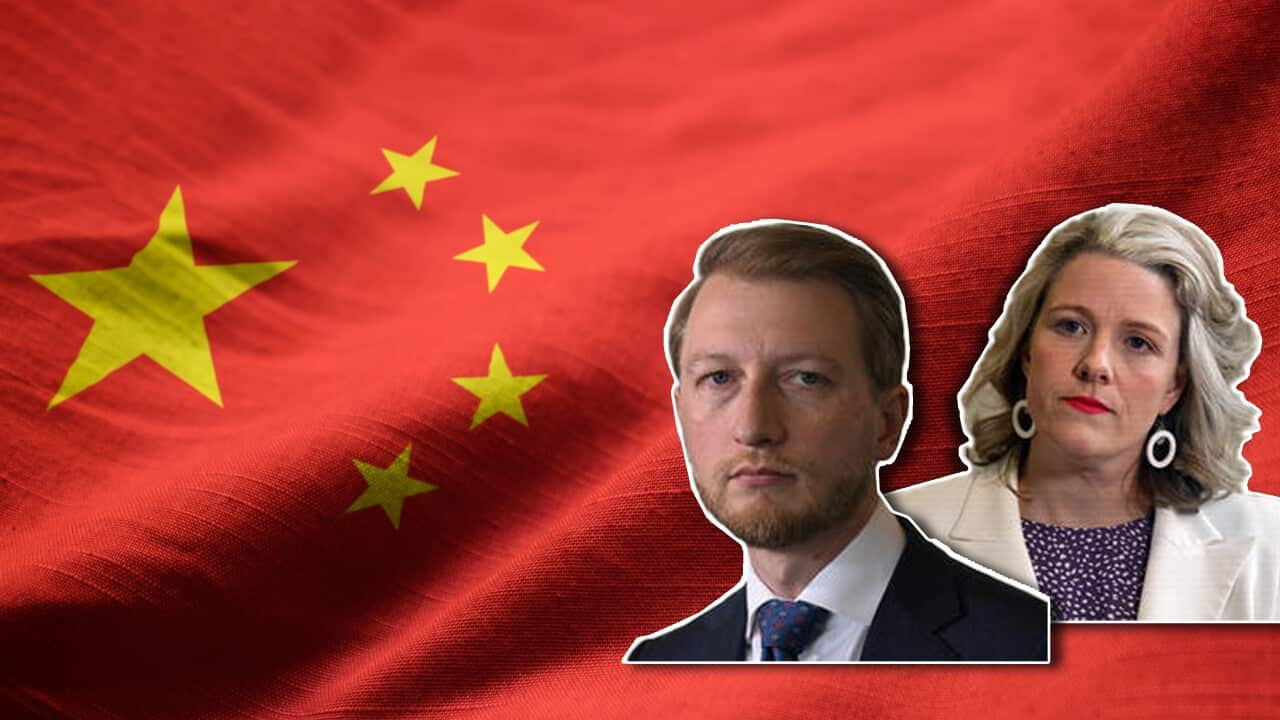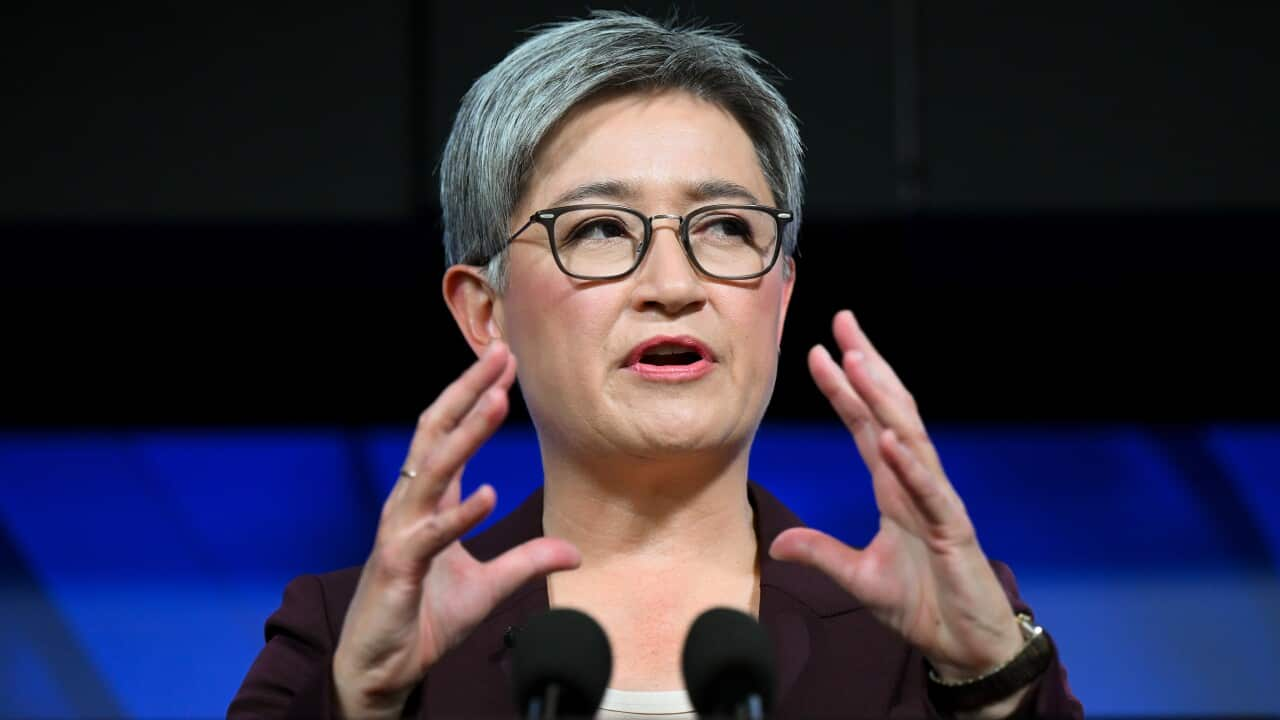KEY POINTS:
- James Paterson has told Labor to speak plainly on Chinese foreign interference.
- The new Opposition home affairs spokesperson warns terrorism could come from "any corner" of society.
- Senator Paterson took over the portfolio last week as part of a major reshuffle.
Labor is being dishonest by refusing to name China as the "number one source" of foreign interference in Australia, new Opposition spokesperson for home affairs minister James Paterson says.
Senator Paterson has also warned the next terror attack could come "from any corner" of Australian society, but investigations may be hampered by Labor dismantling the home affairs portfolio in "all but name".
Australia's intelligence community has been sounding the alarm over foreign interference, with .

Home Affairs Minister Clare O’Neil named Iran as the country behind a foreign interference plot. Source: AAP / Mick Tsikas
The speech was delivered months after , as part of an effort to ease tensions with Beijing.
, Senator Paterson said bilateral relations should never come at the expense of national security, but insisted it was up to the government to explain why Beijing was not named.
“Let's be honest, Iran is not the number one source of foreign interference or espionage in our country. It's not even close. The Chinese government is the number one source ... The minister and the government have not been open and honest in discussing that issue," he told SBS News.
"It should be at the forefront of the government's public discussion, particularly if it says he wants to lead a conversation about foreign interference and espionage.”
Ms O'Neil's office did not respond to a request for comment.
, over fears it was being used by the Chinese Communist Party to disseminate misinformation among the Chinese diaspora in Australia.

Senator Paterson wants the government to "seriously examine" WeChat, but says a ban would have a serious impact on many Chinese-Australians. Source: Getty
Senator Paterson urged the government to to "seriously examine" available options on the app, but said his preference was to avoid a ban.
"For many Chinese-Australians, it is an indispensable tool to communicate with their families, and we have to be mindful of the impact [a ban] would have on them ... [But] we can't allow it to continue to be a massive source of disinformation and undermining our social cohesion," he said.
Terror could come from 'any corner': Paterson
The domestic terror landscape has shifted dramatically over the past three years, with the COVID-19 pandemic accelerating extremism, according to Mr Burgess.
“The truth is that the threat of terrorism could come from any corner, from any part, of our community. We have to be on top of it ... wherever it comes in a spectrum," Senator Paterson said.
Under the former Coalition government in 2021, Mr Burgess announced ASIO would ditch references to "Islamic extremism" and "right-wing extremism" when discussing terrorism, replacing them with binary definitions of "ideologically-motivated" or "religiously-motivated".
The new terms are controversial among extremism experts, some arguing they are too broad as to be meaningless.
, while feeding far-right narratives about what Islam is.

Australian Security Intelligence Organisation director-general, Mike Burgess. Source: AAP
"Most of the people involved in this activity aren't sitting down reading political philosophy ... They're motivated by a grab bag of often contradictory motivations, including conspiracies and grievances. So, to try and fit it into a left-right spectrum has often been unsatisfactory," he said.
Lone wolf attackers remain the major threat: ASIO
The December 2022 Wieambilla ambush, in which two police officers and a neighbour were murdered by a trio of attackers, laid bare the complexity in defining extremist motivations.
, but the killers also appear to have subscribed to a number of anti-government and anti-vaccine conspiracy theories partially rooted in their form of Christianity.
Senator Paterson said while the umbrella terms remained valuable, nuanced discussion about an attacker's ideology was also vital to preventing others being led towards violence.
"Whether it is an Islamist-motivated terrorist, a neo-Nazi or a white supremacist-motivated terror attack, we should be specific about those when they arise," he said.
"I think it's helpful from a public discussion point of view, from an academic and from a practical point of view, that we understand where, how and why these people were motivated.”
Politicians were alarmed in March, when roughly 30 members of the National Socialist Movement performed Nazi salutes during a public march through central Melbourne.
But ASIO said the primary terror threat remained so-called "lone wolf" attackers, avoiding detection by operating as a single-person cell, though sometimes loosely affiliated to organised extremist groups.

The caskets of Constable Rachel McCrow and Constable Matthew Arnold, killed in the Wieambilla ambush. Source: AAP / Supplied
ASIO continues to report to Ms O'Neil, but the Australian Federal Police now reports to Attorney-General Mark Dreyfus.
“Labor has dismantled the home affairs portfolio in all but name ... It makes sense to have those operational agencies working as closely together as possible, reporting to the same minister and under the same department," he said.
"Now, [those agencies] have got different bosses that they have to please, who might have different objectives. I think that is going to lead to things falling through the cracks and, unfortunately, that might have real consequences for Australians and their safety."










